Jan. 11, Tue, 2022
Topics
>RESEARCH
All for the Patient! Juntendo’s Department of Neurology Leads the Charge in Parkinson’s Disease Therapy and Research
Parkinson’s disease is the second most common neurodegenerative disease worldwide after Alzheimer’s disease. The number of patients with the condition is surging as Japan’s population ages. Juntendo University’s Department of Neurology is said to be one
of the world’s leading hubs for clinical practice and research on Parkinson’s disease, with approximately 4,000 patients visiting the hospital annually. We asked Dr. Nobutaka Hattori, a professor in the Department of Neurology who also serves as the Dean
of the Faculty of Medicine and the Dean of the Graduate School of Medicine, about the current status and future directions for clinical practice, research, and education in this field.
※1 Equipped with levodopa-carbidopa intestinal gel therapy devices, which can continuously inject therapeutic agents either enterically or subcutaneously, as well as DBS devices, for which patients are fitted with deep-brain electrodes, enabling direct electrical adjustment of the abnormal signals being produced by faulty intracerebral circuitry.
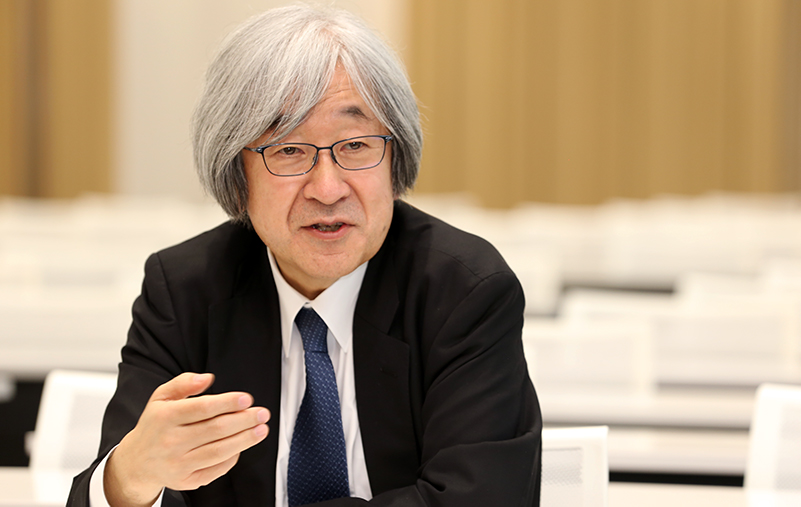
Proving that even with Parkinson’s disease, one can live a full life.
Historically, Parkinson’s disease has been said to be an “inexorable, progressive, intractable disease” that leaves patients “bedridden in the future.” The world’s attitude towards the disease was previously overwhelmingly pessimistic. Nowadays, however,
the outcomes for patients have improved considerably. An increasing amount of novel therapeutic agents are being developed for clinical applications, and these therapies are developed with the desire to ensure that patients will continue to be able to
receive therapy. For example, in terms of daily life, our hospital introduced ICT-based life support in 2017. In terms of society, barrier-free environments are becoming more widespread, and the expanse of the internet has made it easier for patients
to obtain information. There is no doubt that in all senses—therapeutic, daily life-related, societal, and more—Parkinson’s is no longer a disease that will prevent patients from living a long and fruitful life.
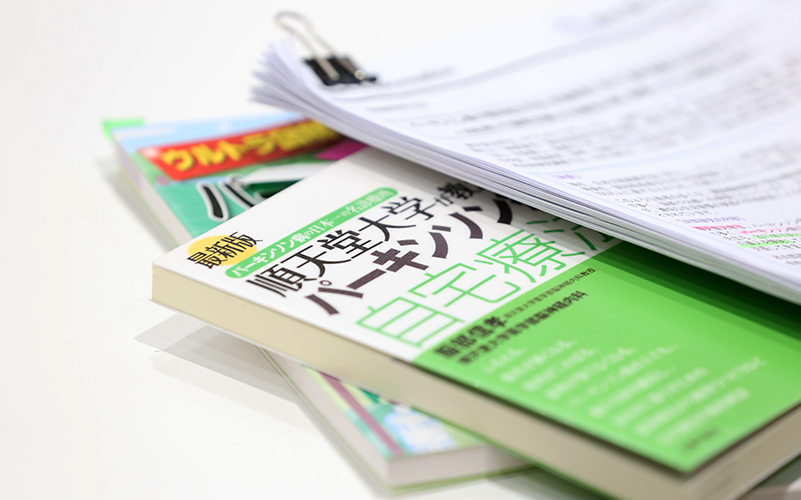 However, even if we, as physicians, have the privilege of believing that the outlook of Parkinson’s disease has changed for the better, we do not know if patients are truly satisfied with the care they are receiving. For this reason, Patient-Reported
Outcomes (PROs) have become critically important. As physicians, in addition to monitoring how our results improve, we must pay attention to how PROs improve. In fact, I am currently working with our patients to develop a system that enables them to also
participate in the development of physician-led guidelines. What do you do in the bathroom? What do you do when you can’t sleep? We believe that we can fundamentally increase patient satisfaction by creating patient-centered QOL-focused guidelines in
this way.
However, even if we, as physicians, have the privilege of believing that the outlook of Parkinson’s disease has changed for the better, we do not know if patients are truly satisfied with the care they are receiving. For this reason, Patient-Reported
Outcomes (PROs) have become critically important. As physicians, in addition to monitoring how our results improve, we must pay attention to how PROs improve. In fact, I am currently working with our patients to develop a system that enables them to also
participate in the development of physician-led guidelines. What do you do in the bathroom? What do you do when you can’t sleep? We believe that we can fundamentally increase patient satisfaction by creating patient-centered QOL-focused guidelines in
this way.
Parkinson’s disease has an enormous mental impact on patients. For this reason, I make sure to give each of my patients a small sticker with my portrait on it, and to tell them that “I will always be there for you.” When they feel low, and when they are struggling, I hope that they can take a look at this sticker, and comfort in the fact that they are not alone. I hear that some of my patients seem to call these mental effects a “clothing magic.”
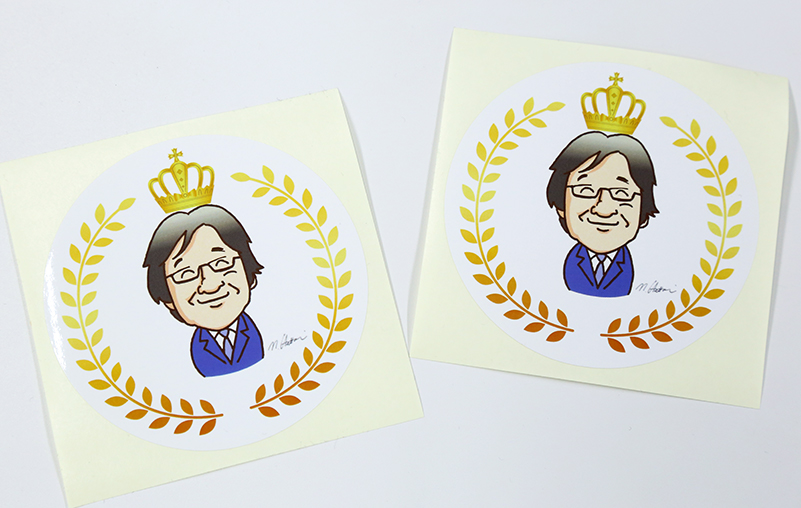
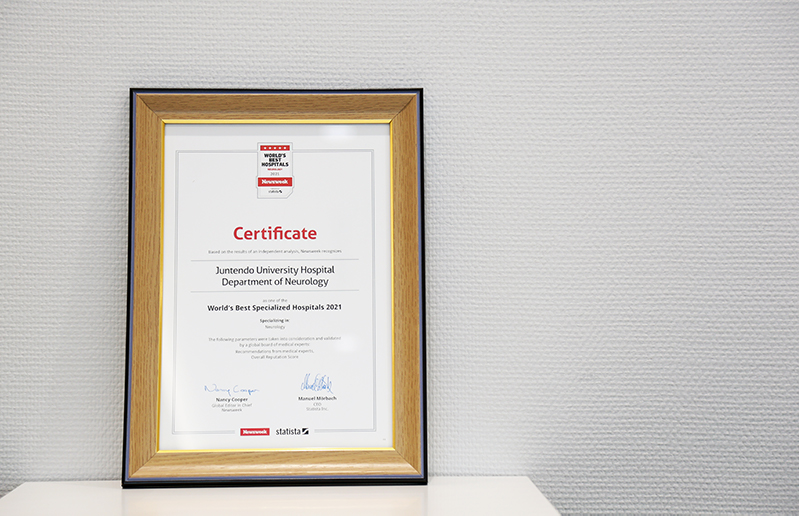 Young researchers are playing an active role in our department, presenting papers one after another and achieving meaningful results. One of the reasons for this is the policy of our predecessor, Professor Mikuni Mizuno. I was the first graduate student
supervised by Professor Mizuno at Juntendo. I am who I am today because Dr. Mizuno allowed me to go to Nagoya University to study Parkinson’s disease, and because he established such an enriching research environment within the school. However, at the
beginning of my study life, it was a continuum of difficulties.
Young researchers are playing an active role in our department, presenting papers one after another and achieving meaningful results. One of the reasons for this is the policy of our predecessor, Professor Mikuni Mizuno. I was the first graduate student
supervised by Professor Mizuno at Juntendo. I am who I am today because Dr. Mizuno allowed me to go to Nagoya University to study Parkinson’s disease, and because he established such an enriching research environment within the school. However, at the
beginning of my study life, it was a continuum of difficulties.
Discussing on equal footing
When I was researching at Nagoya University, I did not have money, and I could not buy furniture. I used an empty box of oranges as a desk. Nevertheless, I poured everything I had into my research, day in and day out, and just as we were about to publish
information on the structure of a particular gene, another researcher beat us to the punch. I still remember the frustration I felt that day.
Afterward, I returned to Juntendo without any research results and set up a molecular biology laboratory from scratch. This eventually became our current Department of Neurology. At the same time, I was trying to make some headway in genetic research. I ended up discovering a new genetic structure, so I asked Professor Nobuyoshi Shimizu of Keio University, who was in charge of the Human Genome Project at that time, to take a look. However, Dr. Shimizu answered, “My boy, this is a pseudogene. Our system can find constructs like these in a day.” I was stunned. I had spent 4 years researching it.
Due to these experiences, I felt that it was important to obtain accurate information sooner. I am still strictly instructing young researchers about the importance of speed in their work; all of this is because I have experienced what it feels like to lose out on publication opportunities because of speed. Researchers in the field will naturally study the same topics. He who does not come first in research, comes last.
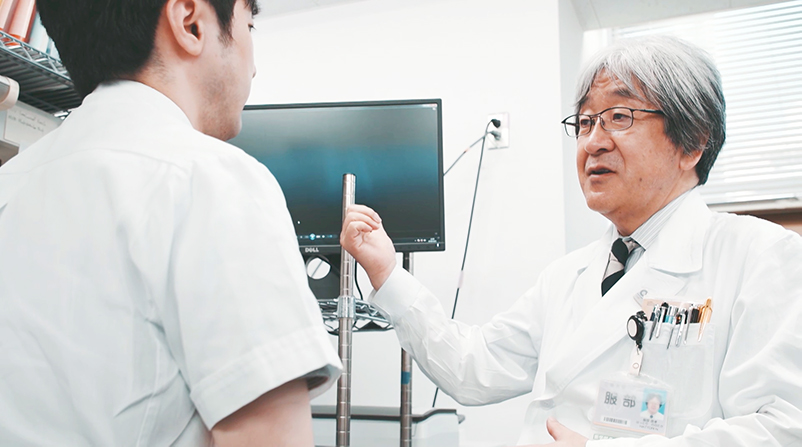 Another important task for researchers is funding acquisition. That is why I have been working hard since I was a graduate student and have never lost funding for my research. We work to ensure that all members of our department can acquire funding. I
would be happy if everyone got their research expenses. I still make sure to check the application form for large-scale research funds prepared by my subordinates and make corrections. It is the policy of laboratory management to give guidance from an
equal standpoint in academic discussions and from a professor standpoint in terms of speed and research funding.
Another important task for researchers is funding acquisition. That is why I have been working hard since I was a graduate student and have never lost funding for my research. We work to ensure that all members of our department can acquire funding. I
would be happy if everyone got their research expenses. I still make sure to check the application form for large-scale research funds prepared by my subordinates and make corrections. It is the policy of laboratory management to give guidance from an
equal standpoint in academic discussions and from a professor standpoint in terms of speed and research funding.
We hope to bring nurses and other health professionals into the fold once the coronavirus situation subsides, and we are able to attend international conferences. It does not matter whether you speak English or not. It is also of great educational importance for people from various countries to come together to talk about Parkinson’s disease. I have also sponsored a study group that provides training for physical therapists, pharmacists, and nurses. This is also because Juntendo, as a whole, wants to grow as a single team.
CBS is the best research center for brain science research in Japan. Until now, they have collaborated with only two university research teams, both from the University of Tokyo; thus, it is a great honor to have the opportunity to create a Juntendo University team there. I was really happy when I heard the news from them.
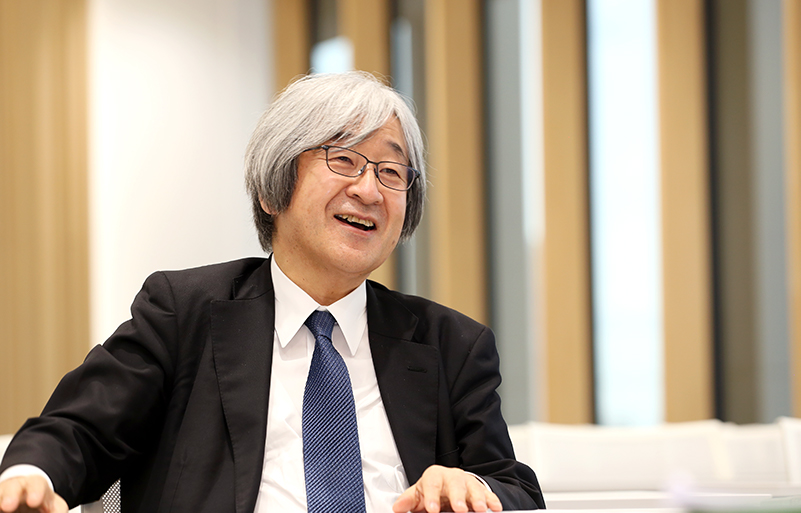
In addition to CBS, our department has worked with manufacturers of medical devices, pharmaceutical companies, and other enterprises across a variety of fields to investigate the many different research ideas they bring to us, from AI to DNA and everything in between. I present these ideas to my subordinates and watch over them as they investigate. Everyone is doing really well.
For the sake of our patients, we strive to do everything we can in all arenas: in clinical practice, research, and education. Each and every endeavor of ours is for them. If we do not take care to stick to a stance of “research for the patient’s sake,” we could potentially take a wrong turn somewhere down the line, and slip into carrying out “research for research’s sake.” We will continue to “march on unceasingly” for the sake of all of our patients.
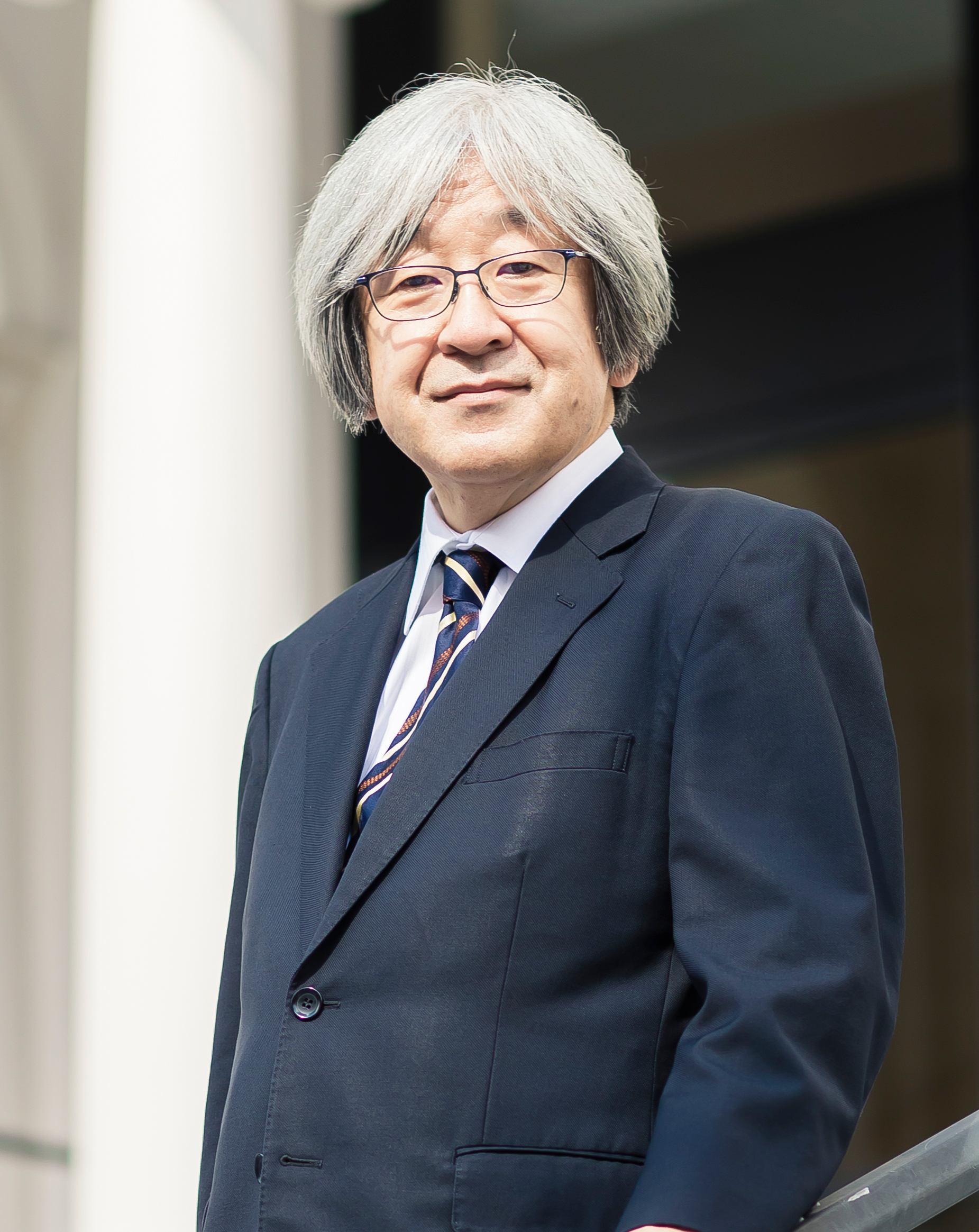
Nobutaka Hattori
Dr. Hattori became an Assistant Professor in the Department of Neurology at the Juntendo University School of Medicine in 1995. In 1999, he became a Lecturer. In 2002, he became an Assistant Professor, and in 2006 a Professor of Neurology at the Graduate School of Medicine. In 2008, he became Deputy Director of the Center for Geriatric Diseases and Therapeutics, Graduate School of Medicine, Juntendo University. Since 2019, he has served as the Dean of the School of Medicine and Dean of the Graduate School of Medicine. He has served as a Visiting Professor and Visiting Researcher at a variety of other institutions, and in October 2020, he was appointed as the leader of the Neurodegenerative Diseases Research Team at the RIKEN Center for Brain Science. He has received numerous awards, including the Chairman’s Encouragement Award from the Japan Foundation for Aging and Health, Beltz Prize, the Japanese Society of Neurology Award, the Minister of Education, Culture, Sports, Science and Technology Award, and the Narabayashi Prize from the Japanese Society of Neurology.
Email: pr@juntendo.ac.jp
Juntendo’s cutting-edge outpatient clinic for Parkinson’s disease
Parkinson’s disease is an intractable disease caused by the degeneration of nerves in the brain. It is estimated to affect between 1 and 1.5 out of every 1,000 people, and the older the person, the higher the incidence. Approximately 4,000 patients with Parkinson’s disease visit the Department of Neurology at Juntendo University Hospital annually, with the largest patient population in Japan. Our ability to apply the data and specimens obtained from this large patient population to the study of new treatments for Parkinson’s disease is Juntendo’s biggest strength. In 2017, we introduced the world’s first online medical care system for Parkinson’s disease, and in September 2019, we opened the first device treatment outpatient clinic in Japan (∗1). In October 2020, we were the first in the world to introduce the latest deep brain stimulation (DBS) equipment, enabling us to provide our patients with cutting-edge treatments.※1 Equipped with levodopa-carbidopa intestinal gel therapy devices, which can continuously inject therapeutic agents either enterically or subcutaneously, as well as DBS devices, for which patients are fitted with deep-brain electrodes, enabling direct electrical adjustment of the abnormal signals being produced by faulty intracerebral circuitry.

Proving that even with Parkinson’s disease, one can live a full life.
Maximizing patient satisfaction is critical.
Historically, Parkinson’s disease has been said to be an “inexorable, progressive, intractable disease” that leaves patients “bedridden in the future.” The world’s attitude towards the disease was previously overwhelmingly pessimistic. Nowadays, however,
the outcomes for patients have improved considerably. An increasing amount of novel therapeutic agents are being developed for clinical applications, and these therapies are developed with the desire to ensure that patients will continue to be able to
receive therapy. For example, in terms of daily life, our hospital introduced ICT-based life support in 2017. In terms of society, barrier-free environments are becoming more widespread, and the expanse of the internet has made it easier for patients
to obtain information. There is no doubt that in all senses—therapeutic, daily life-related, societal, and more—Parkinson’s is no longer a disease that will prevent patients from living a long and fruitful life.
We want to tell patients that we are always there for them
To tell you the truth, I aspired to become a doctor after seeing the Akira Kurosawa movie “Akahige” (Red Beard) in high school. Watching a doctor treat a patient, treat his mind, and treat his family all at once left a deep impression on me. Parkinson’s disease is a life-long illness, and doctors develop lifelong relationships with their patients. For this reason, I strive to create communities and relationships where doctors speak with patients on an equal footing, rather than speaking down to them. As a part of this, I usually use several types of SNS and mails to communicate with patients. Of course, I also serve the university in a variety of positions, so I have limited time, but whenever I can, I try to directly answer my patients’ questions and offer them advice. I know that they rely on me. While I often operate in academic capacities, I must admit that I hold my “stance” as a clinician to be of utmost important.Parkinson’s disease has an enormous mental impact on patients. For this reason, I make sure to give each of my patients a small sticker with my portrait on it, and to tell them that “I will always be there for you.” When they feel low, and when they are struggling, I hope that they can take a look at this sticker, and comfort in the fact that they are not alone. I hear that some of my patients seem to call these mental effects a “clothing magic.”

The Cranial Neurology department ranks first in Japan and tenth in the world for the World’s Best Specialized Hospitals ranking in neurology!
In November 2020, Juntendo Medical Hospital Neurology was selected as the best hospital in Japan and the tenth best worldwide in the field of neurology in the World’s Best Specialized Hospitals 2021 ranking published in the journal Newsweek.
Discussing on equal footing
Guidance on speed and funding acquisition through a professor’s eyes
When I was researching at Nagoya University, I did not have money, and I could not buy furniture. I used an empty box of oranges as a desk. Nevertheless, I poured everything I had into my research, day in and day out, and just as we were about to publish
information on the structure of a particular gene, another researcher beat us to the punch. I still remember the frustration I felt that day.Afterward, I returned to Juntendo without any research results and set up a molecular biology laboratory from scratch. This eventually became our current Department of Neurology. At the same time, I was trying to make some headway in genetic research. I ended up discovering a new genetic structure, so I asked Professor Nobuyoshi Shimizu of Keio University, who was in charge of the Human Genome Project at that time, to take a look. However, Dr. Shimizu answered, “My boy, this is a pseudogene. Our system can find constructs like these in a day.” I was stunned. I had spent 4 years researching it.
Due to these experiences, I felt that it was important to obtain accurate information sooner. I am still strictly instructing young researchers about the importance of speed in their work; all of this is because I have experienced what it feels like to lose out on publication opportunities because of speed. Researchers in the field will naturally study the same topics. He who does not come first in research, comes last.

Tackling Parkinson’s not by ourselves as physicians, but in teams, with all health personnel
Teamwork is also a core principle of my laboratory. Normally, there is a sense of distance between a professor like me and other health professionals, such as young doctors, nurses, physical therapists, or pharmacists. However, I believe that the lack of distance between members in various occupations gives rise to new ideas.We hope to bring nurses and other health professionals into the fold once the coronavirus situation subsides, and we are able to attend international conferences. It does not matter whether you speak English or not. It is also of great educational importance for people from various countries to come together to talk about Parkinson’s disease. I have also sponsored a study group that provides training for physical therapists, pharmacists, and nurses. This is also because Juntendo, as a whole, wants to grow as a single team.
Clinical practice, research, and education: all for the patient
In October 2020, I was appointed as the team leader (concurrently) of the RIKEN Center for Brain Science (CBS) and Neurodegenerative Diseases Collaboration Research Team. I run two laboratories, at the University and at CBS, to promote research into Parkinson’s disease and related disorders.CBS is the best research center for brain science research in Japan. Until now, they have collaborated with only two university research teams, both from the University of Tokyo; thus, it is a great honor to have the opportunity to create a Juntendo University team there. I was really happy when I heard the news from them.

In addition to CBS, our department has worked with manufacturers of medical devices, pharmaceutical companies, and other enterprises across a variety of fields to investigate the many different research ideas they bring to us, from AI to DNA and everything in between. I present these ideas to my subordinates and watch over them as they investigate. Everyone is doing really well.
For the sake of our patients, we strive to do everything we can in all arenas: in clinical practice, research, and education. Each and every endeavor of ours is for them. If we do not take care to stick to a stance of “research for the patient’s sake,” we could potentially take a wrong turn somewhere down the line, and slip into carrying out “research for research’s sake.” We will continue to “march on unceasingly” for the sake of all of our patients.

Nobutaka Hattori
Professor, Department of Neurology, Graduate School of Medicine, Juntendo University
Professor, Department of Neurology, Juntendo University School of Medicine
(Dean of Medical School and Dean of Graduate School of Medicine)
Dr. Hattori became an Assistant Professor in the Department of Neurology at the Juntendo University School of Medicine in 1995. In 1999, he became a Lecturer. In 2002, he became an Assistant Professor, and in 2006 a Professor of Neurology at the Graduate School of Medicine. In 2008, he became Deputy Director of the Center for Geriatric Diseases and Therapeutics, Graduate School of Medicine, Juntendo University. Since 2019, he has served as the Dean of the School of Medicine and Dean of the Graduate School of Medicine. He has served as a Visiting Professor and Visiting Researcher at a variety of other institutions, and in October 2020, he was appointed as the leader of the Neurodegenerative Diseases Research Team at the RIKEN Center for Brain Science. He has received numerous awards, including the Chairman’s Encouragement Award from the Japan Foundation for Aging and Health, Beltz Prize, the Japanese Society of Neurology Award, the Minister of Education, Culture, Sports, Science and Technology Award, and the Narabayashi Prize from the Japanese Society of Neurology.
Media Contact
Takeshi Matsuura, Public Relations Division, General Affairs Department, Juntendo UniversityEmail: pr@juntendo.ac.jp